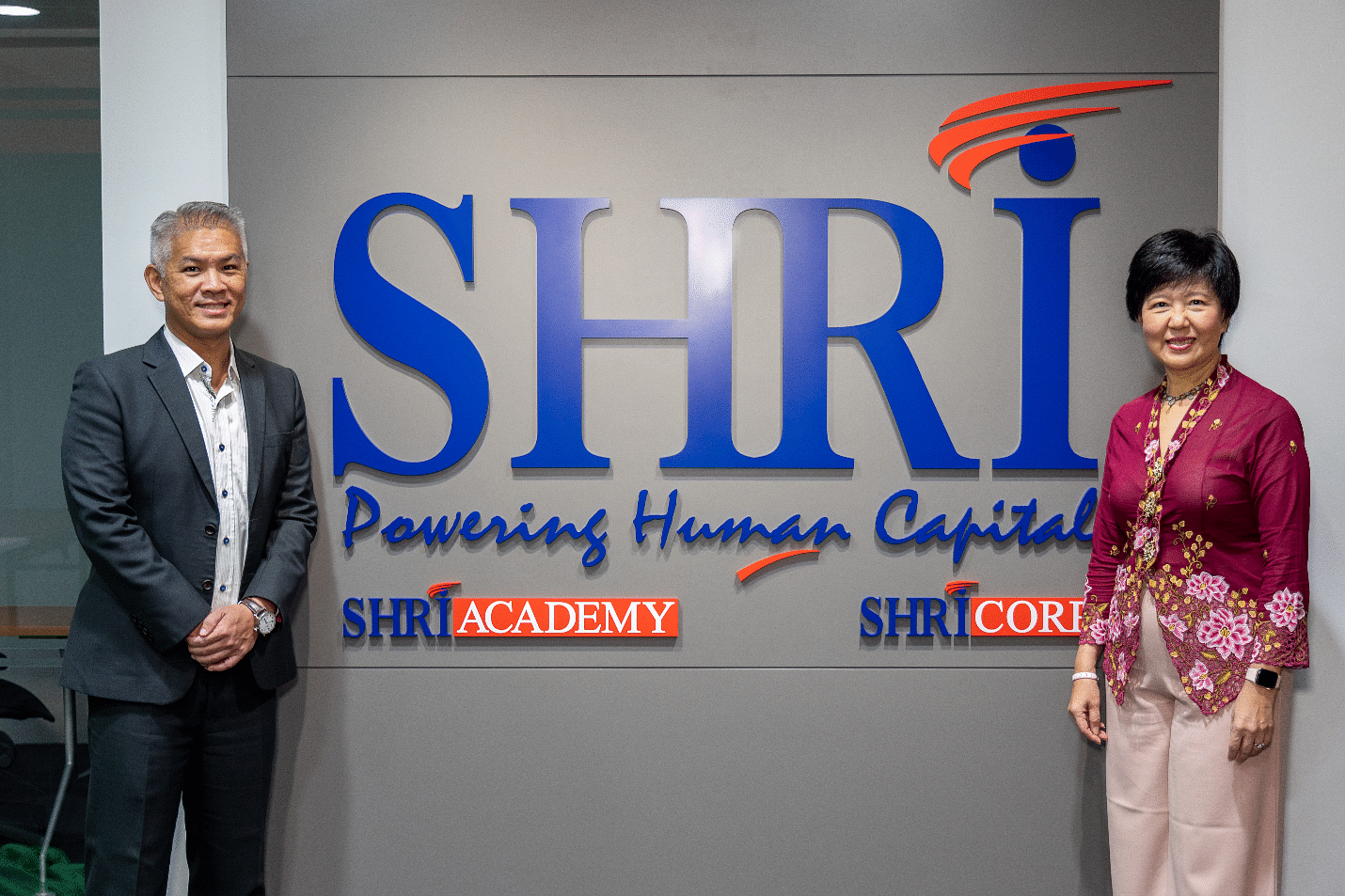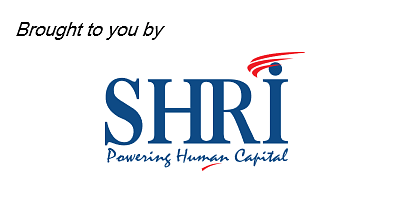BRANDED CONTENT
Future-proofing organisations with a people-centric approach
Winners of the Singapore HR Awards lead the way in empowering employees through upskilling and digitalisation to thrive in the evolving workplace

Singapore Human Resources Institute's executive director Mr Alvin Goh (left) and president Ms Low Peck Kem lead the organisation in recognising HR teams that champion human capital. PHOTO: SHRI
Ms Amanda Aw wears two hats. She is a Human Resources (HR) Business Partner at Far East Organization, and also a Champion of Productivity, like her colleague Nicole Ko from the Employer Branding & Communications department.
As Champions of Productivity, Ms Aw and Ms Ko work with the IT department to roll out digital tools for staff to work from home, providing the empathetic human touch to help colleagues adjust and adapt to changes in the workplace.
When the Far East Organization adopted new collaboration tools like Microsoft Teams and Asana during the pandemic, the Champions of Productivity were there to promote digital literacy and bridge learning gaps, particularly for less tech-savvy colleagues. Using a people-centric approach, Far East Organization enabled their employees to acquire new skills with greater ease, and more importantly, cope with changes in their workplace with greater confidence.
Forward-thinking organisations like Far East Organization are good examples of how businesses are taking care of employee well-being, and their learning and development needs even as they embrace digital transformation. Amidst these rapid changes, HR teams need to make their strategy even more agile to prepare employees for the future of work.
Speaking at the Singapore Human Resources Institute's virtual HR Awards presentation this morning (Nov 19), Senior Minister of State for Manpower Mr Zaqy Mohamad urged businesses to refresh their workforce strategy to better optimise and develop the local workforce for a more sustainable growth model.
This year's winning organisations have managed the fast-changing nature of workplaces well while helping their employees stay connected. They have also demonstrated that organisations of any size can prepare for the future by focusing on employee well-being, transforming the work environment and employee experience through technology, and prioritising learning and development.
This year's winning organisations have managed the fast-changing nature of workplaces well while helping their employees stay connected. They have also demonstrated that organisations of any size can prepare for the future by focusing on employee well-being, transforming the work environment and employee experience through technology, and prioritising learning and development.
Mr Alvin Goh, Executive Director, SHRI, says: "As the business ecosystem across the world adapts to a rife of change and transformation management initiatives, the role that HR professionals play are getting broader and broader. No longer can we just be content with the conventional approach on managing our function. We have to look into upskilling and reskilling both for ourselves and our workforce to ensure the relevance of our competencies so as to meet the needs of the digital economy, and to create a work environment that is empowering."
Empowering employees through digital transformation
National Parks Board (NParks) is another winner that leverages technology to help its employees do their job better. It won the Distinguished Award for "Best Organisation in Championing Human Capital" in the public sector and not-for-profit category.
With more than 2 million urban trees, 3,300 hectares of nature reserves, more than 350 gardens and parks, and 360 kilometres of park connectors across the island under its stewardship, NParks proactively integrates technology into all its work processes as it transforms Singapore into a "City in Nature".
To facilitate digital transformation, it consolidated all greenery, park facilities and biodiversity data on a Geographic Information System (GIS) platform. A training roadmap, together with on-the-job training and curated learning programmes, allows employees to pick up skills needed to leverage technology during the course of their work, deepen their scientific knowledge and broaden their skill sets.
As a science-led and community-focused organisation, NParks has developed various ecosystems of digital tools and analytics in tree management, conservation and park management, among others.
For example, the Safe Distance @ Parks app and CCTV analytics enabled NParks to manage visitor levels in its parks and ensure the public's safety amid a pandemic, while reducing on-site manpower deployment.
Through virtual training sessions, NParks has continued to train citizen scientists on how to carry out biodiversity surveys of wildlife. Nature lovers were able to go on virtual tours and enjoy online concerts.
With more than 2 million urban trees, 3,300 hectares of nature reserves, more than 350 gardens and parks, and 360 kilometres of park connectors across the island under its stewardship, NParks proactively integrates technology into all its work processes as it transforms Singapore into a "City in Nature".
To facilitate digital transformation, it consolidated all greenery, park facilities and biodiversity data on a Geographic Information System (GIS) platform. A training roadmap, together with on-the-job training and curated learning programmes, allows employees to pick up skills needed to leverage technology during the course of their work, deepen their scientific knowledge and broaden their skill sets.
As a science-led and community-focused organisation, NParks has developed various ecosystems of digital tools and analytics in tree management, conservation and park management, among others.
For example, the Safe Distance @ Parks app and CCTV analytics enabled NParks to manage visitor levels in its parks and ensure the public's safety amid a pandemic, while reducing on-site manpower deployment.
Through virtual training sessions, NParks has continued to train citizen scientists on how to carry out biodiversity surveys of wildlife. Nature lovers were able to go on virtual tours and enjoy online concerts.
Driving a continuous culture of learning
An enlightened, nimble and proactive HR team, regardless of the size of the organisation, is critical for building a supportive culture where employees take ownership of their professional development.
NParks encourages lifelong learning through staff ambassadors known as Hort Champs. During the pandemic, the Hort Champs took the initiative to conduct online workshops on popular topics such as managing pests and plant diseases, and the use of fragrant plants. Open to the public, these workshops not just helped employees of NParks stay connected, and keep their knowledge and skills up-to-date, but also helped to raise public awareness on the importance of horticulture.
Meanwhile, Sciente International Pte Ltd, the winner for "Best Organisation in Championing Human Capital" in the SME category, has made continuous learning part of its DNA from inception.
The ISO9001 and DPTM certified local IT recruitment and talent management consulting firm's HR has developed bite-sized content for self-directed learning, on-the-job training, and a one-on-one coaching and mentoring programme. These efforts form part of a learning and development framework that can be customised to each individual's needs.
Meanwhile, Sciente International Pte Ltd, the winner for "Best Organisation in Championing Human Capital" in the SME category, has made continuous learning part of its DNA from inception.
The ISO9001 and DPTM certified local IT recruitment and talent management consulting firm's HR has developed bite-sized content for self-directed learning, on-the-job training, and a one-on-one coaching and mentoring programme. These efforts form part of a learning and development framework that can be customised to each individual's needs.
Increased focus on employee well-being
Remote work has blurred the line between work and life. Many workplaces have doubled down on employee well-being and mental health. Such an increased focus on employee well-being is critical to developing workplace resilience.
Mandai Wildlife Group, one of the winners in the "Employee Well-being" category, launched the CARElephant Programme in 2020. This is a workplace wellness concept designed to improve and maintain the well-being of employees. The holistic approach is guided by eight wellness dimensions: physical, intellectual, emotional, social, spiritual, occupational, financial and environmental.
Mandai Wildlife Group, one of the winners in the "Employee Well-being" category, launched the CARElephant Programme in 2020. This is a workplace wellness concept designed to improve and maintain the well-being of employees. The holistic approach is guided by eight wellness dimensions: physical, intellectual, emotional, social, spiritual, occupational, financial and environmental.
Organised by the Singapore Human Resources Institute, the annual Singapore HR Awards recognises HR leaders and organisations for their efforts in championing human capital.
Find out more about the Singapore HR Awards here.
HR trends for the future of work
1. Employee well-being
To nurture employee well-being for workplace resilience
To nurture employee well-being for workplace resilience
2. Talent management and acquisition
To retain and engage talents, and to select the right people for the job
To retain and engage talents, and to select the right people for the job
3. Diversity and inclusion
To design and promote a fair and inclusive culture within and outside of the organisation so that individuals can thrive
To design and promote a fair and inclusive culture within and outside of the organisation so that individuals can thrive
4. HR data and tech
To continue to build on mindset shift to drive technology and analytic capabilities in HR to improve people-related decisions
To continue to build on mindset shift to drive technology and analytic capabilities in HR to improve people-related decisions
5. Building capabilities
To ensure workforce remains relevant and agile by constant upskilling and reskilling
To ensure workforce remains relevant and agile by constant upskilling and reskilling
Source: Singapore Human Resources Institute



